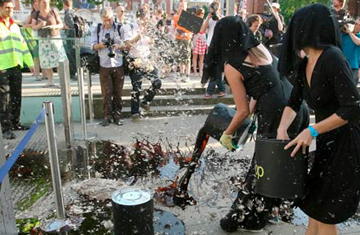
Demonstrators pour oil and feathers outside Tate Britain to protest BP's sponsorship of the arts
At 5 p.m. on a recent drizzly evening in London, 50 people dressed in black make their way into Tate Modern, the capital's biggest and most respected contemporary art gallery. Once inside the gallery's massive main hall, they form a circle. Then each person produces a large tube of paint printed with the BP logo, place it on the floor and stamp on it. Thick black oil paint splurges spectacularly over the Tate's floor, as the gallery staff look on, bemused.
The mess-making isn't a piece of performance art, but a protest against BP's long-standing sponsorship deal with the prestigious Tate galleries: Tate Britain, Tate Modern, Tate Liverpool and Tate St. Ives. The protesters from Liberate Tate, a group dedicated to freeing the organization from its contracts with BP, had scheduled their action to coincide with a Wednesday meeting of the Tate's board of trustees. Rumor had it that the meeting would include discussion of BP's 20-year contract, worth $1.5 million a year, and whether or not to renew it for another five years. The cozy relationship between the arts and major corporations has often proved a controversial issue. But now, thanks to the Gulf of Mexico oil spill, protesters — already angered by oil's role in climate change and human rights abuses — are focusing their crosshairs on BP.
"Ten years ago tobacco companies were seen as respectable partners for public institutions," says protestor Blake Williams. Today BP's sponsorship, he argues, is "equally unethical for an art museum." And, he adds, not just an art museum. The oil giant gives money to almost all of London's most prominent arts institutions, including the British Museum, the Royal Opera House, the Natural History Museum, the National Theatre and the National Portrait Gallery. "It's so galling to see every single cultural attraction in London that I care about stained with this horrible, horrible sponsorship," says fellow Liberate Tate member Tom Costello.
Tate won't reveal what was discussed at Wednesday's meeting, but it's quick to defend its oily bedfellow. "BP is one of the most important sponsors of the arts in the U.K., supporting Tate as well as several other leading cultural institutions," says Tate spokeswoman Ruth Findlay in a statement to TIME. "Its support has been instrumental in helping Tate present changing displays of work by a wide range of artists."
This week's Liberate Tate demonstration was just the latest in a long summer of protests sparked by the spill. At a June event to celebrate 20 years of BP sponsorship of the Tate galleries, protest group The Good Crude Britannia threw buckets of molasses over the entrance to Tate Britain. For the finishing touch they threw handfuls of feathers into the air, which fluttered down to stick to the spillage. And in July, protesters at the British Museum poured buckets of molasses around the base of Hoa Hakananai'a, a 1,000-year-old giant carving of a human head and torso (the statue itself was spared a glooping).
Critics accuse BP of using blockbuster exhibitions and arts awards (the highlight of the National Portrait Gallery's year is the "BP Portrait Award") to direct attention away from their environmental and ethical crimes. "These sponsorship deals give companies like BP the social license to operate," says Dan Gretton, co-founder of Platform, an arts and research charity that puts pressure on arts organizations to dump their oil partners. "Having these links with cultural organizations is a way for them to launder their image."
But there are those who argue that, in this age of austerity, the arts can't afford to turn away funding from anyone. "If they can get money from Satan himself," wrote art critic Jonathan Jones in The Guardian, "they should take it." Tiffany Jenkins, a sociologist who specializes in cultural policy at the London School of Economics, has some sympathy with this view. "I think for arts institutions it's important to have a mixed funding stream. That may mean money from organizations like BP, philanthropists, the state and the public," she says. "That diversity gives them freedom and flexibility to pursue whatever they want to artistically without being reliant on one funder." Nicholas Serota, director of the Tate, seemed to agree when he said of BP in a recent interview: "You don't abandon friends because they have a temporary difficulty."
But Serota also once said, "Art exists to change the status quo. Sometimes you have to take a moral standpoint to provide that space for questions to be raised." And there protesters see an inherent hypocrisy: How can you take a moral standpoint if you're being sponsored by companies many consider to be immoral?
As an example, protester Costello points to a new play showing at the National Theatre. "Earthquakes in London," Costello says, "is an incredible piece of theatre." He feels its climate-change message is somewhat compromised, though, by the fact that the National Theatre has both BP and Shell as sponsors. "At one point a character turns to the audience and asks, 'Are you embarrassed? Well, you should be,'" says Costello. "Oh the irony!"
In some cases, protests — or the threat of them — have succeeded in breaking up a lucrative friendship. In 2008, London's Natural History Museum cancelled its deal with Shell as sponsors of the "Wildlife Photographer of the Year" exhibition. However, it took two years of relentless campaigning from action groups like Rising Tide and Art Not Oil to get the result. When it comes to BP, Platform's Gretton is optimistic: "Realistically it will take between a year and 15 months to get these sponsorship deals cut." If that happens, some of Britain's most respected arts institutions will suddenly find themselves scrambling for another sponsor — and one that's squeaky clean.
